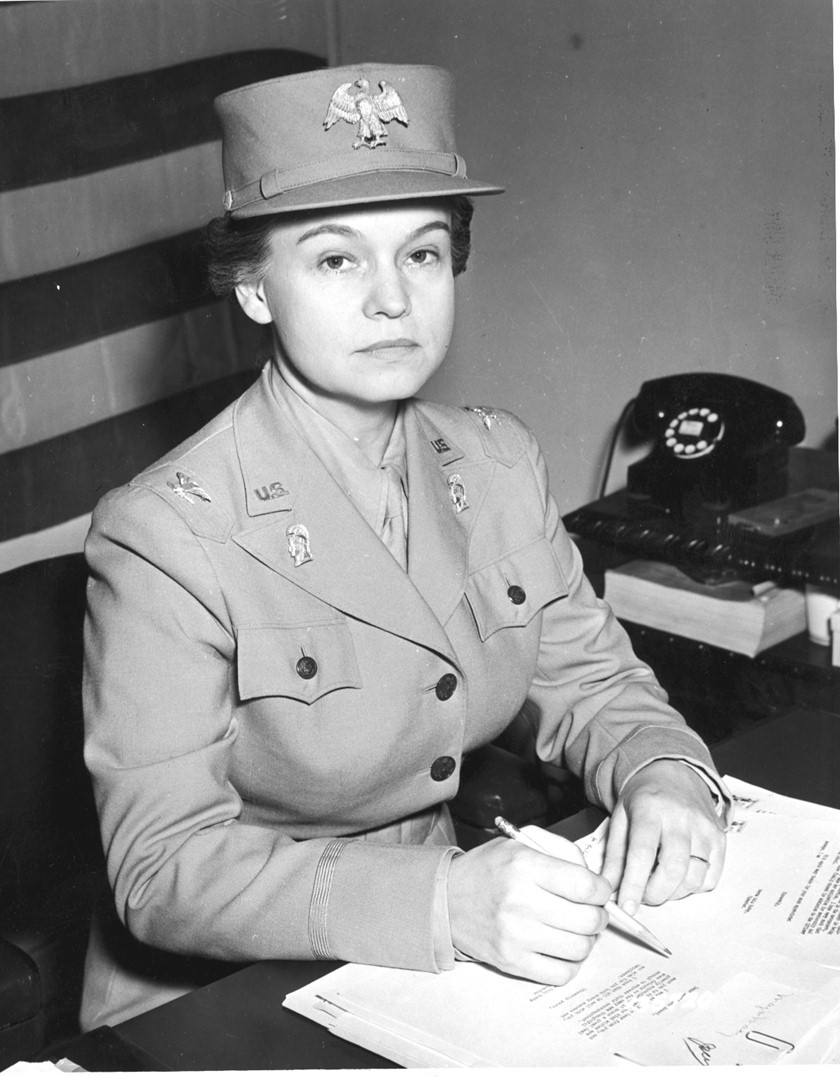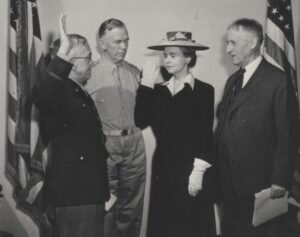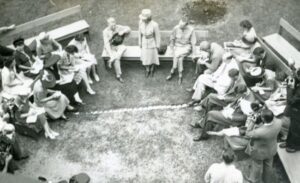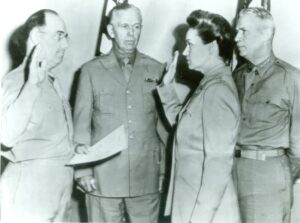In ancient Greek Mythology, Athena is the goddess of knowledge, sciences, and war. If Athena had been born in the 20th century, her name would have been Oveta Culp Hobby.
The daughter of a lawyer and legislator, Hobby had no shortage of educational opportunities; she attended three different schools in her home state of Texas. She was working on the editorial staff of the Houston Post when she was called upon in 1942 to create and lead the Women’s Army Auxiliary Corps, whose members would not be officially part of the U.S. Army. Hobby’s title was “Director,” reflecting her civilian status. Hobby chose Athena as the emblem of the WAAC, reflecting the warrior status of these civilian soldiers.

Oveta Culp Hobby wearing Athena on her uniform lapels.

Oveta Culp Hobby being sworn into Women’s Army Auxiliary Corps by Maj. Gen. Myron C. Cramer, Judge Advocate General. Joining her in the ceremony are Army Chief of Staff Gen. George C. Marshall and Secretary of War Henry L. Stimson.
The first WAAC class reported to Fort Des Moines, IA, in July 1942. Director Hobby visited the class, and according to one WAAC candidate, “The post has been swarming with reporters and photographers. I wish I could write what I feel, but you know. It is a fascinating experience and if we can do something worthwhile the work will be very satisfying.”

Directory Hobby speaking with the press at Fort Des Moines during the the first WAAC training class.
Director Hobby and the War Department soon realized that the WAAC members were needed overseas, but that they were not given the same protections soldiers were given. The WAAC was converted to the Womens Army Corps, officially part of the U.S. Army. Hobby was promoted to Colonel, and continued to lead.

Directory Hobby speaking with the press at Fort Des Moines during the the first WAAC training class.
As the WAC members endured character slander, Hobby , U.S. Army and War Department leaders endeavored to set the record straight – the more than 150,000 WACs were hard-working, patriotic women who wanted to serve their country just like the men did. Marshall wrote to Hobby
On my return from Africa I learned of the attack which had been directed against the integrity of the Women’s Army Auxiliary Corps. The Secretary of War has already stated in forcible terms the views of the War Department in the matter, but I wish to assure you personally of my complete confidence in the quality and value of the organization which has been built up during the past year under your leadership.
Marshall further indicated his support of the WAC in a statement:
The Women’s Army Corps is now an integral part of the Army and a highly essential part of our war effort. Its units have met their responsibilities with efficiency and are rendering an invaluable service. However, reports indicate that there are local commanders who have failed to provide the necessary leadership and have in fact in some instances made evident their disapproval of the Women’s Army Corps. The attitude of the men has quickly reflected the leadership of their commanders, as always.
All commanders in the military establishment are charged with the duty of seeing that the dignity and importance of the work which women are performing are recognized and that the policy of the War Department is supported by strong affirmative action.
Hobby was the first woman awarded the Army’s Distinguished Service Medal for Outstanding Service, which was the highest non-combat award at the time.
After the war, Hobby went to to be the first head of what we now know as the Department of Health, Education and Welfare, where she approved the first polio vaccine in the United States.
After stepping away from government in 1955, Hobby returned to Texas, and assisted her husband in running The Houston Post. After her husband passed away in 1964, she continued to serve on many charity boards, including the American Red Cross and the American Cancer Society. She remained active in these until her death in 1995, at age 90.
Before becoming director of library and archives at the George C. Marshall Foundation, Melissa was an academic librarian specializing in history. She and her husband, John, have three grown children, and live in Rockbridge County with three large rescue dogs. Melissa is known as the happiest librarian in the world! Keep up with her @MelissasLibrary.
Eryn Davis is a library science graduate student at Clarion University of Pennsylvania, and is working for a while in the Marshall Foundation Library archives accessioning collections. After graduation she hopes to find a permanent job working in library archives.
